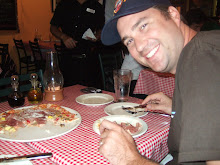Fikadu was the director of Hope for the Hopeless. He was a middle aged family man. He told his story to us the day we drove to the country side, and like all people in Ethiopia, his story was remarkable. Fikadu had worked for an international company that headed up 160 child projects. It was at this time that the Muslim influence in Ethiopia pushed Christians to leave the area and the projects closed because of this. Fikadu found himself without a job and in following his calling, he linked up with Pastor Surefel and Hope for the Hopeless. His work began along side Surefel over eight years ago.
Fikadu is the leader and pastor of a local Lutheran church in Ethiopia. His heart is burdened to love the children and to teach them, though his role at church is much bigger than that. His favorite thing about his job is helping orphans to grow in their spiritual life and to educate them on the truth of Christ. He loves the children he cares for and treats them as if they are his own, with one exception. Years ago, when Fikadu was much younger, he fell in love with an older orphan that he was ministering to. The Lord brought them together and they later wed. They are now the proud parents of an 8 year old girl and a 10 year old boy. His relationship with his orphans is so personal that years after the children have left and begun their own lives, they will come back to visit and serve Hope for the Hopeless and the churches the kids attend.
Fikadu was with us our last four days and hosted us at all the Hope for the Hopeless facilities. He was an organized man, an obviously respected man, but above all, he was a man of great love and compassion that was wore on his sleeve for the world to see. When you saw him, you could see Christ living in him. He was warm with the children and encouraged them to smile, play, and sing us songs. He would work to translate between us and the children and he was a man I knew I could trust immediately. There was a peace in him that just made me at ease.
On the drive back from the boys' and girls' home, I asked Fikadu if he ever brought his children to the orphanage. He was reluctant to answer, and a slow "no" finally sqeaked out. I was wanting to invite his family to the party planned the next day but wanted to be sure he was comfortable with it. He went on to say that he didn't bring his children to "work" because how would he be able to explain to his children that his own children would not be able to eat the desireable food that the orphans were getting? My heart sank. The orphans have had their food cut to bare bones that we would consider neglectful by American standards and yet HIS children would have lesser quality? How could this be true? Yet, I knew it was.
Over the course of the days, we learned that with increased costs, Fikadu no longer can take public transportation to work most days. It is NOT a short walk, but he walks it all the same. His daughter cries herself to sleep at night because of a tooth ache, and yet he can not take her to the dentist for the required work. His children have been enrolled in private school and now, he is really struggling with having to cut them out of it (public school is NOT a good option there and many children without families, including the children from his orphanage, go to private school instead). He is not sure how he will afford to send them. And yet, with the huge food cuts and empty beds at Hope for the Hopeless, he also can not take a pay raise. This is the kind of problem that SO MANY people, even the working people, face daily in Ethiopia. There is simply not enough to go around and get NEEDS met.
Kim and I agreed to pay for his family to have meat for dinner. We sent him back to work that Saturday with 500 birr to stop by the butcher on the way home and have his wife cook up a feast for his whole family. He was humble and appologetic. We would not accept his appology. We wanted to do this for a man whom has done so much for so many. It was the least we could do. He was wishing he had said nothing of his children not going to the home... we didn't want to make him feel over indulged, but wanted to help where we could. He took the money. He was very grateful, and said thank you many times. And yet you could see a big part of him that was weighing whether it was right. Did the kids at Hope deserve the money more? I could see him working to make peace with it.
Since I have been home, people have asked if they were to give money to this organization if the money would get to the kids. This post serves as my answer to that question.





0 comments:
Post a Comment